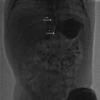The conservative approach for infantile gastric volvulus
- PMID: 40323478
- PMCID: PMC12053205
- DOI: 10.1007/s00383-025-06007-9
The conservative approach for infantile gastric volvulus
Abstract
Objectives: This study evaluates the outcomes of conservative management of chronic gastric volvulus in a series of neonates, with a focus on diagnostic and therapeutic approaches.
Methods: A retrospective review was conducted on 13 patients diagnosed with chronic gastric volvulus between 2015 and 2024. The clinical and imaging data were analyzed, including age at diagnosis, sex, presenting symptoms, treatment type, and follow-up outcomes. Diagnosis was confirmed with contrast-enhanced upper gastrointestinal radiography. Conservative treatment involved gradual enteral feeding via orogastric tube, specific positional strategies, and total parenteral nutrition.
Results: Of the 13 patients (7 female, 6 male; mean age: 39.23 days), 12 were successfully managed conservatively, with only one requiring surgical gastropexy. The most common presenting symptom was non-bilious vomiting. The mean follow-up was 30.61 months (95% CI: 18.37-42.86 months) revealed all patients achieved weight above the 10th percentile. Conservative management showed a 90.9% success rate, significantly higher than previously reported rates.
Conclusion: Chronic gastric volvulus, often misdiagnosed as GERD, requires clinical suspicion and contrast-enhanced imaging for accurate diagnosis. Conservative management is effective, reducing the need for surgical intervention when standardized protocols are applied.
Keywords: Conservative; Infant; Mesenteroaxial; Organoaxial; Vomiting.
© 2025. The Author(s).
Conflict of interest statement
Declarations. Conflict of interest: The authors declare no competing interests.
Figures
References
-
- Scherer LR (2012) Chapter 79 - peptic ulcer and other conditions of the stomach. In: Coran AG (ed) Pediatric surgery, 7th edn. Mosby p, Philadelphia, pp 1029–39
MeSH terms
LinkOut - more resources
Full Text Sources



